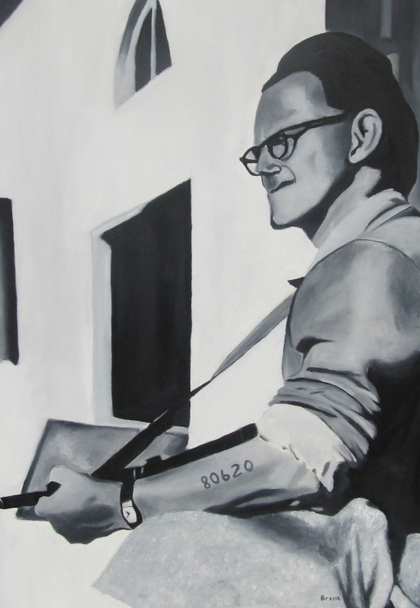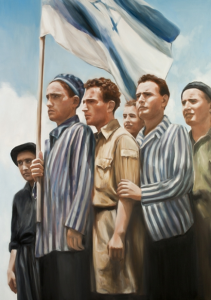Again Miriam sang the Hatikva aboard a ship, but this time it was sung in a tone of triumph. A few days after her arrival, her paternal uncles Moshé and Mordechai arrived early in the morning to pick her up. Although she had promised herself she would only smile at them, she broke down into tears.
As the two uncles were single and lived by themselves, Miriam went to live with one of her father’s cousins, Aunt Mania, who received her lovingly. Now she felt at home, in the midst of a large and united family, whose members did their best to help each other and spend time together, even during simple occasions.
Her uncles came often to take her to different parts of Tel Aviv, where she could see the prosperity and modernity she had not seen in Europe. They also took her to meet her relatives who lived in Kibbutz Ein Hashofet, which had been founded in the arid mountains of Ephraim by groups of Jews from America and Eastern Europe in the 1930s.
Their visit to that kibbutz made very good impressions on Miriam. Her little cousins slept in simple collective rooms and were taken care of by monitors. Their education emphasized life and work in the field, and from a very young age they could recognize each flower by name. The fields were green, orchards had lots of fruits, the stalls were clean and equipped with modern machines. The adults worked in the field during the day and in the evening they played with the children on the grass, in the center of the kibbutz. The administration meetings were held periodically and were attended by all adult members.
Back in Tel Aviv, while Miriam struggled to keep pace with her new schoolmates, the UNESCOP had recommended that Britain give up her mandate over Palestine. Miriam and her relatives listened to the November 29th vote of the Partition Resolution on the radio. Each vote for the resolution caused explosions of joy in the streets. When the number of votes exceeded two-thirds, the joy of the people was indescribable – people sang and danced in the streets.

Unfortunately, the celebrations did not last long as the Arabs did not accept the Partition Plan. The following morning brought the first shots and the first victims. Looting began in Jerusalem and other towns. Miriam was perplexed at the wave of terror that had broken out against the Jewish population of 650,000 people, who were not prepared for a war. The Arabs attacked the convoys of supplies going to Jerusalem, the isolated kibbutzim, and the streets in Tel Aviv that were close to Jaffa. Arab tanks would come against the colonies in the Negev and in Galilee. But the British, who had not yet ended their mandate, continued to arrest the fighters of the Haganah and confiscate their guns, while the Arabs would daily cross the borders bringing theirs.
As the end of the British mandate drew closer, the maapilim held in Cyprus began to be released. Miriam finally saw her friends from the Cyprus camp again, as well as Judith, who had come with her husband and her little baby, born in Cyprus. During the war, Miriam participated in several campaigns to collect clothes, blankets and utensils for the newcomers, for it was winter. At school, she and her classmates had permission to knit sweaters for the combatants of the Haganah during some of the classes.
The war intensified as the British were preparing to leave. Jerusalem was under siege and bombardment. The Hadassah Hospital and the Hebraica University were isolated on Mount Scopus. The day before the Proclamation of Independence, the four colonies of Gush Etzion in the mountains of Judea had been attacked and conquered by the Arab Legion, which had been trained and supplied by the British.
On May 14, 1948, in the afternoon, Miriam listened to the dynamic words pronounced by David Ben Gurion on the radio. On the following morning, Harry Truman was the first dignitary to recognize the State of Israel, while the Arabs invaded the Israeli territory on all fronts. The Egyptians came with their tanks from the South, towards Tel Aviv. The Syrians and Lebanese attacked the North. The Iraqi and the Arab Legion attacked the center of the country, while the Egyptian air force bombarded residential areas.
Despite fighting on all sides, resistance to the enemy was strong and decisive. While the fighters in the kibbutzim in the Negev repelled the Egyptians, the settlers in the North fought the Syrians. The old city of Jerusalem, however, after months of siege and privations, fell to the Arabs. The defenders were arrested; the women and the children were sent to the new part of the city. Those were days of anguish also in Tel Aviv, where Miriam could hear the noise of the bombs the Egyptian dropped on the central bus station, causing the death of many civilians.

During the first truce, the country received arms, ammunition and new immigrants, many of whom enlisted in the new army right after they arrived. The Arabs attacked before the end of the truce, but now Israel was better prepared, with an increase in the number of combatants, weapons, and the acquisition of planes from Czechoslovakia. Although the Arabs had also improved their forces, the British intervened and requested a new ceasefire in order to prevent their defeat.
When an armistice seemed closed, Chaim Weizmann was designated the first President. His euphoric reception by the Israeli population was equaled by their enthusiasm in the first Yom Haatzmaut (Independence Day), when the separate agreements had been signed between Israel and the other six belligerents.
During the following months, Miriam got good grades at school. Although the war was formally over, she did not want to be a burden on her family during those years of privation, thus she decided to become a nurse. She completed the examinations and was admitted to the school of Beilinson Hospital in Tel Aviv, where she studied and worked as a nurse.
Beilison Hospital was the most important hospital in Israel at the time, since the Hadassa hospital had been evacuated and access to it was blocked by the Jordanian Legion. The place was always crowded, due to its importance and to the constant arrival of new immigrants, who made its hallways sound like the tower of Babel.
In the following months, the Jews from the Arab countries began to arrive; they had to leave their homes in haste and had much difficulty adapting to their new life in Israel. It was common for Miriam to assist patients from different origins in the same bedroom: Europeans, Africans, Asians, Americans. Although speaking different languages, they were all Jews.
Continue reading: Brazil